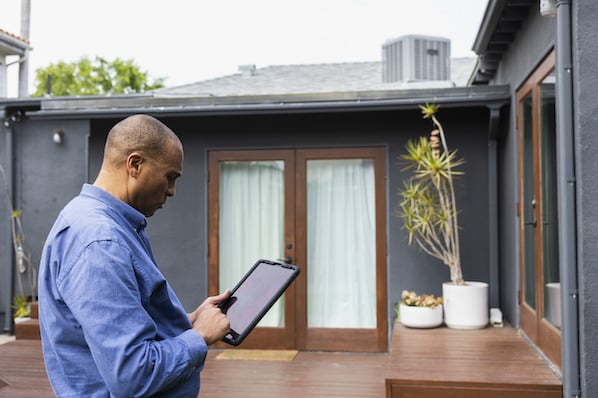Homebuying has become increasingly digital nowadays. Documents can be signed virtually, homes can be viewed remotely through an audio-visual presentation, and real estate agents are expected to be online.

The number of first-time buyers has grown to 34% this year, from 31% in 2020. With more buyers in the market,COVID-19 guidelineshave increased the amount of work required to execute digital and private showings.
So, where should real estate agents begin to adapt to these changes? They can start with a strong email marketing strategy.
The fastest way to modernize your outreach is by applying short, direct, and personalized email campaigns.
To help you get started, here are the real estate email templates that will usher your communication into the digital age.
Real Estate Email Templates
- Open House or Showing Follow-Up Email
- Neighborhood Expertise Email
- Under Contract Email
- Expired Listing Email (If Not Listing Agent)
- Expired Listing Email (If Listing Agent)
- New Listing Email
- Low-Interest Rate Email
- Client Retention Email
- Testimonial Email
- Data-driven Email Template
- Thank You Email Template
- Email to Potential Sellers
- Real Estate Email Newsletter
- Open House or Showing Thank You Email
- One-Year Follow-up Email
- Home Valuation Offer
- Open House Feedback Request
- Follow-up Email To Clarify Buyer’s Needs
- Offering Tips To Help Seller Attract Buyers
- Pre-approval Email To Prospective Buyer
1. Open House or Showing Follow-Up Email
Hello [Prospect],
It was great meeting you at [address] last weekend. I hope you got a good feel for the house and the [benefit of the property — i.e., great pool, huge primary bedroom, beautiful view]. Let me know if I can answer any questions.
If you’re interested in the neighborhood, I have another property available nearby. It has many of the wonderful qualities that [address] has, with a few surprises! I’d be happy to set up a private showing for you this week.
Thanks again for stopping by!
Regards,
[Your name]

Whether you have a previously established relationship with the prospect through a private showing or an open house, it's smart to follow up. If it’s the latter, this email sets a proactive and polite tone for the rest of your business relationship.
Thank them for their time and remind them of the home’s most attractive attributes. Then tease another home, and leave them wondering what “surprises" it holds. Sure, they can probably find it online, but they’ll still be curious to uncover the house’s secrets in person.
2. Neighborhood Expertise Email
Hello [Prospect],
Thanks so much for stopping by [address] last Sunday. It was great to meet you!
If you’re interested in seeing more homes in this neighborhood, there are a few I’d like to show you. It’s a competitive area, but my expertise in buying and selling in [neighborhood] is unparalleled.
Before we jump into anything serious, I’d love to learn more about what you’re looking for in a new home. I also want to share my approach to the homebuying process to make sure I’m the right fit for you. If you’d like to set up a time to meet, click this link to book a schedule on my calendar: [Link to Meeting tool]
Regards,
[Your name]

No one wants to feel pressured into buying a particular home or choosing a specific real estate agent. In this email, you have acknowledged their interest in the open house and offered a wider selection of homes in the neighborhood.
You’ve also hinted at your expertise without overtly saying, “I’m the best, and you’d be remiss not to work with me." Communicate that the right fit is your primary objective, and you are sure to set yourself apart from eager and pushy agents.
3. Under Contract Email
Hello [Prospect],
Thanks for your interest in the property at [address]. It was a pleasure meeting you. As you have probably heard, this house is currently under contract.
I know that can be disappointing, but I have good news! Several other homes in the area are coming soon, and I’d be happy to arrange a private or early showing just for you.
[Neighborhood] is a competitive area right now, but with my expertise, I’m sure we can find the perfect home for you.
Regards,
[Your name]

This email is always disappointing to a buyer, so it’s crucial to lead with the problem (this house is no longer for sale) and move quickly to the solution (I have more houses to show you).
A sentence at the end acknowledging the market’s competitiveness will provide a sense of urgency. It demonstrates your understanding of the unique real estate market in their area, which gives your authority a boost.
4. Expired Listing Email (If Not Listing Agent)
Hello [Prospect],
I noticed your listing for [address] was recently expired. You’re probably feeling overwhelmed, frustrated, and impatient. But no worries, I can help you with that.
Many times, when homes don’t sell, real estate agents blame the price. That’s not quite fair. These homes often suffer from poor marketing. That’s why I consider myself both a marketer and a Realtor.
I have sold [number] houses in [neighborhood] in an average of [number] days for [percent] over asking price. I do it with smart marketing and knowledge gained during [number] years of serving the [city] area.
I have several ideas on how to better position your property, and I’d love to hear what you think about it. If you’d be interested in learning how we can get your house back on the market and competitive, grab some time on my calendar here: [Insert link to Meeting tool]
Regards,
[Your name]

When a listing expires, sellers often feel betrayed, frustrated, and worried about the financial implications.
The goal of this email is to acknowledge their feelings, restate the problem, and offer a unique solution. Keep this email short and to the point with concrete facts proving you know what you’re doing. These prospects don’t want eloquent statements on how you’ll help them find their dream home. They want to know you can sell their home fast and for a good price.
5. Expired Listing Email (If Listing Agent)
Hello [Client name],
Your listing has expired. You're frustrated and likely being overwhelmed by other real estate agents offering you a magic bullet to sell your home. You have every right to shop your listing around. But here's why you should stick with me.
I know your property inside and out. I've been carefully collecting buyer and agent feedback, monitoring other homes in the neighborhood, and have an intimate familiarity with what makes your home unique.
I'm prepared to offer you a new limited-service option with a discounted commission. That means you save money.
I have an action plan for how I think we can move forward and sell your home in 30 days or less. I'd love to discuss it with you in person or over the phone at your most convenient time. Book time on my calendar here: [Insert calendar link]
I know this is not where either of us hoped to be, but I'm determined to find the right buyer for you and your home.
Regards,
[Your name]

Acknowledge your seller's natural frustration, but don't apologize. You have done everything on your end to sell their property. Show confidence by explaining the benefits of staying with you instead of working with a new agent. Be clear, concise, and don't lean on emotion.
End with a call to action that encourages them to book a time with you to discuss the matter in greater depth.
6. New Listing Email
Hello [Client name],
Here are a few listings I think you’ll like. They meet your criteria of being in [neighborhood #1] and [neighborhood #2]. And they have [requirement #1], [requirement #2], and [requirement #3].
- [House #1]
- [House #2]
- [House #3]
- [House #4]
- [House #5]
Let me know if you’d like a private showing for any of these homes. If none of these hit the mark, I want to know that too. Looking forward to hearing what you think about these houses (especially #4!).
Regards,
[Your name]

Clients can easily access new homes on sites like Zillow or Redfin, so work extra hard to make these emails engaging and valuable. Use the resources only available to licensed realtors to show them homes they can’t find anywhere else.
7. Low-Interest Rate Email
Hello [Prospect name],
Hope you’re enjoying the [local weather, holiday season, annual event, etc.]!
I thought you’d be interested to know that interest rates in your area have dropped to [percent]. If you’d like to learn what price your home could be listed for and what your options are for buying, click this link to book time on my calendar: [Link to Meeting tool]
Now get back to enjoying the [local weather, holiday season, annual event, etc.]
Regards,
[Your name]

This email is great for reconnecting with past clients or farming new ones. If you have current clients shopping in a low-inventory area, send this email to previous clients who live in or around that neighborhood. You never know who you might tempt to move.
Keep this email from feeling “salesy” by leading with just how much these rates could benefit the seller and personalize it with local news or events.
8. Client Retention Email
Hello [Prospect name],
I hope you’re settled into your home and loving it!
Now that the hard part is over, I thought you’d be interested to learn how to increase your home’s value over the next few years. Here are a few ideas:
- [Article about home improvement project #1]
- [Article about home improvement project #2]
- [Article about home improvement project #3]
If you have any questions about how to get started, or if you need recommendations on good carpenters, handymen, electricians, etc., I’d be happy to share my favorites.
Happy home improving!
[Your name]

The typical seller has recommended their agent twice since selling their home. Around 27% of sellers have recommended their agent four or more times since selling their home. You can increase your number of potential clients by asking your current clients for referrals.
Information such as increasing their home value and local deals on home products/services will keep you in the buyers’ minds the next time they move or ask for a referral.
9. Testimonial Email
Hello [Prospect name],
Choosing a Realtor can be tough, and finding the right fit is one of the most important decisions you can make. Realtors (including myself) throw around a lot of stats about buying and selling homes, but it comes down to people looking for a place to be healthy, happy, and build a life.
To help illustrate how very human and personal this process is, I wanted to share a story from a recent client, [client name].
[Insert client testimonial]
If you’re interested in learning how I can help you find a perfect fit like I did for [client name], click this link to set up a meeting: [Insert link to Meetings tool]
Regards,
[Your name]

Homebuying is an emotional experience. Tap into those feelings with a carefully selected testimonial from a favorite client.
Most clients will be happy to provide you with a glowing review (especially right after a seamless and successful close). You can also ask Yelp reviewers whether you can use their testimonials in future email marketing. These emails are great for reminding previous clients how great you are. They also work well when farming new leads.
10. Data-driven Email Template
Hello [Prospect],
Is it time for something new? If you’ve been considering moving, here are a few reasons why now is the best time to start fresh:
- Housing prices in your neighborhood have risen [percent] over the last five years.
- The average home in [city] is selling in [number] days.
- Homes are selling at an average price of [number].
I have [number] years’ experience selling in your neighborhood, and I am confident that, together, we can sell your home for the maximum return and find your next dream house. If you’re interested in learning more, click this link to schedule a meeting with me: [Link to Meeting tool]
Regards,
[Your name]

Breathe new life into this standby email template by avoiding vague statements like “People are interested in your home." or “There’s never been a better time to sell." Instead, build a data-driven case for why now’s the time to sell and make it easy for them to learn more.
11. Thank You Email Template
Hello [Client],
I hope you’re settling into your new house and that it’s starting to feel like home for you and [family member/pet names].
I wanted to say thanks for choosing me as your Realtor. It was a pleasure working with you, and I’m honored you allowed me to help you during this important process.
If I can answer any questions over the next few weeks and months, please don’t hesitate to reach out. I know you’ll get a lot of junk mail — including misleading letters about your loan — and I’m always happy to help sort real from fake!
Happy nesting,
[Your name]

Homebuyers have a lot of choices when buying or selling a home, and they chose you! Show your appreciation with a kind thank you note and a small gift. Bouquets of flowers, bottles of wine, and complimentary dinners are gestures of appreciation that will go a long way.
First-time homebuyers can be especially overwhelmed by the amount of junk and fraudulent mail they’ll receive after closing. Offer to help them through the first few weeks as new homeowners for an extra-special customer experience.
12. Email to Potential Sellers
Hello [Prospect name],
The market is heating up, and buyers are interested in your neighborhood. This is great news for you because the inventory is low, and the demand is high.
If you'd be interested in discussing the possibility of listing your home, I have some competitive analysis I'd love to share with you. I think you'll be surprised at just how much we could list your home for.
If you'd like to learn more, you can set up a quick 15-minute call with me here: [Insert calendar link]
Regards,
[Your name]

Tease them with information about just how much their home is worth instead of giving them the information immediately. This will increase the chances of getting them on the phone where you can learn more about their goals and share what you can offer in return.
Want to go the extra mile? Say all of this over a video email for a personal message they won't soon forget.
13. Real Estate Email Newsletter
Hello [Prospect name],
Have you been on the fence about buying a home? It's my job to stay on top of the [insert state, city, or neighborhood name] housing market, and now's the time to buy a home and start building your future. Here's why:
- Reason 1: Interest rates are low. Lower interest rates mean lower monthly mortgage payments.
- Reason 2: Buying a home allows you to build equity, which helps you build wealth. Equity may also be used as a down payment for a new home or to make home improvements.
- Reason 3: Taking out a mortgage can positively impact your credit, an essential part of your financial health.
Have I convinced you yet? I understand this is one of the biggest decisions you'll ever make, so if you'd like to set up a time to talk more over the phone, grab time on my calendar here: [Insert calendar link here]
Regards,
[Your name]

The most important part of a real estate newsletter is grabbing your reader's attention with a great subject line. Even if your prospect isn't currently looking to sell, this subject line will tempt them to open.
Follow it up with compelling reasons and a call to action that gives them a specific next step. Personalize this email as much as possible and make it valuable to the reader, so you earn their engagement next time as well.
14. Open House or Showing Thank You Email
Hello [Prospect name],
Thanks for stopping by on Sunday. I wanted to check in and ask if I can answer any questions for you about [insert address]. Also, I thought I'd share a few other similar properties for sale in the area. I'd be happy to set up appointments to view those properties if you're interested:
- Property 1
- Property 2
- Property 3
Homes like these are spending approximately [insert number] days on the market, so let me know if you'd like to get a head start!
Regards,
[Your name]

By offering alternatives homes for your client to view, you can keep the momentum going when the market is hot. There's a chance that home they're viewing today could be sold tomorrow. With this template, you won't waste any time getting your clients interested in the next set of homes for sale.
15. One-year Follow-up Email
Happy house anniversary, [Client]!
I hope you’ve enjoyed the first year in your new home and you have settled in nicely with your family. However, if there is anything you need help with, please let me know.
As you know, the real estate business depends on relationships. So, if you know a friend or colleague looking to buy or sell in [area], I’d be honored if you would pass on my contact information to them.
Regards,
[Your name]

The one-year follow-up email is used to generate referrals and stay in touch with old customers. Former clients are excellent sources for referrals, and staying in touch with them may help them remember you the next time they are looking to buy or sell a property.
Congratulate the client on the first anniversary of buying their home, and encourage them to reach out to you if they need assistance. Also, invite them to refer your services to a friend, family member, or colleague who may be in the market to buy or sell a home. After all, 90% of buyers report that they would use their agent again or recommend their agent to others.
16. Home Valuation Offer
Hello [Prospect Name]!
Thank you for inquiring about our valuation reports for your home on [street name].
I’ll get started on your home’s valuation report as soon as possible. You’ll receive the report within [processing time for valuation report] working days.
When creating the valuation report, I’ll consider the information you provided on your contact form and data on recent house sales on [street name].
In the meantime, is there anything else I can help you with?
Regards,
[Your name]

Sending potential sellers a home valuation offer shows them that you are ready to officially start the process of selling their home. Although only a comparative market analysis will give sellers a specific market value, you can get your leads started with an estimate.
17. Open House Feedback Request
Hi [Prospect name],
Thank you for popping by the open house at [address] last weekend.
I’m reaching out because I’d love to hear your feedback, the good and the bad.
What were your first impressions of the property? How did the property compare to others that you have seen? What do you think of the price?
Please tell me all about your experience during the open house. Here’s my calendar link to book a slot for a feedback chat: [Link to meeting tool].
Your feedback will help me create a better experience in the future.
Regards,
[Your name]
P.S.: There’s a stunning (#)-bedroom on the market in (area name) for a remarkable asking price. I’ll be happy to set up a visit if you like.

Including feedback questions in your email will help to guide the potential feedback chat with prospective buyers.
Asking prospective buyers for feedback on an open house that they attended allows you to get into the mind of home buyers. Feedback will help you determine if the price for the listing makes sense and if the house will sell fast.
18. Follow-up Email to Clarify Buyer’s Needs
Hi, [Prospect]:
Thanks again for taking a minute to chat with me on [conversation date] about buying a home. I’m sure I can help you find one you will love. I have a couple of questions to help me identify the right listings to send you:
- [Clarifying question for buyer]
- [Clarifying question for buyer]
Thanks for taking a moment to reply. It will help me narrow down the search. Feel free to contact me with any additional clarifications you may have about your dream home.
Regards,
[Your name]

Asking your prospects clarifying questions about their needs and what they are looking for in a home will help you narrow the scope of homes you show to the prospects.
19. Offering Tips To Help Seller Attract Buyers
Hi, [Prospect]:
In our last conversation about selling your home, we talked about making some tweaks that would make your house pop with buyers, so I’m sending you a few links to articles with tips and ideas to help you get started:
• [Link 1]
• [Link 2]
• [Link 3]
I regularly work with many reputable landscapers and interior designers, and I would be happy to pass along their contact information to you.
Let me know if you have any questions!
Regards,
[Your name]

Giving sellers tips to attract buyers and offering to connect them with landscapers and interior designers will help them prepare so the property is presented in its best condition and the open house is a success.
20. Pre-approval Email to Prospective Buyer
Hi [Prospect],
Buying a home is one of the biggest decisions you’ll ever make, and the process can be intimidating for anyone. My goal is to help you get familiarized with the home buying process and find out how I can best serve you in addressing and catering to your specific needs.
The first step in the process is getting pre-approved. Pre-approval shows home sellers that you are serious about buying, and it often helps speed up the process once your offer has been accepted.
Here is an article on the specifics of getting your pre-approval: [article link].
Let me know if you have any questions or would like some guidance in taking this first step. I’m also happy to connect you with one of the most experienced loan officers in town once you’re ready to get started.
Best,
[Your name]

Pre-approval shows sellers that potential buyers can obtain financing. It also helps buyers and real estate agents determine the optimal price range and tax range for their property search. It narrows down a buyer’s options and makes the selection process more efficient.
Get creative with potential clients.
Capitalize on those "just looking" prospects and shift them into buyer mode with other tempting properties in the same area and price range.
Buyer and seller inboxes are inundated with emails every day, but real estate agents have the unique and powerful ability to send mail that clients and prospects open immediately. Maximize the impact of each message with the email templates above.
Editor's note: This post was originally published in February 2021 and has been updated for comprehensiveness.
Real Estate

-Sep-24-2022-01-44-12-10-AM.png)
![19 Impressive Examples of Realtor Bios That Win Clients [Template]](https://2406023.fs1.hubspotusercontent-na1.net/hubfs/2406023/Imported_Blog_Media/real-estate-agent-bios-FI%20(1).jpg)


.jpg)